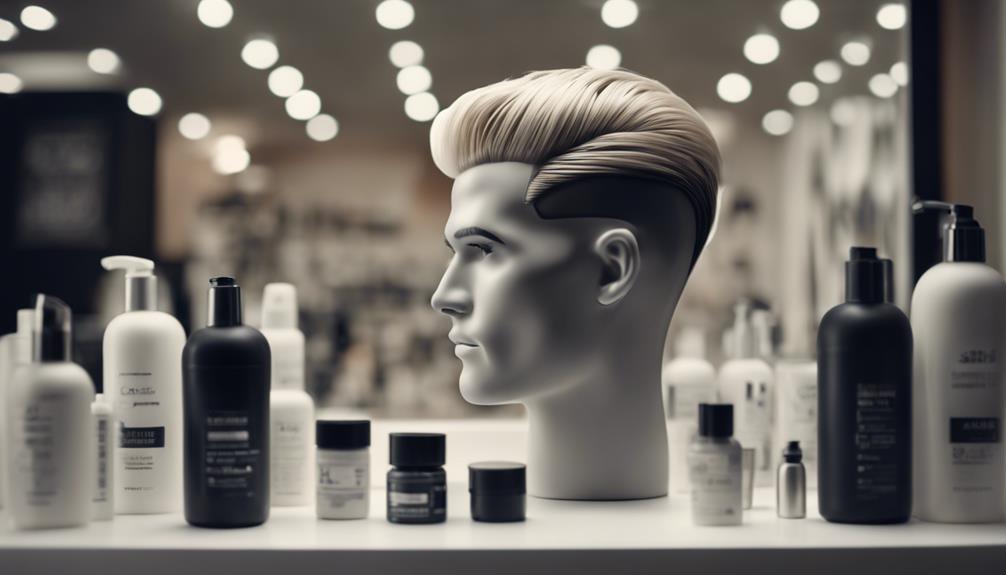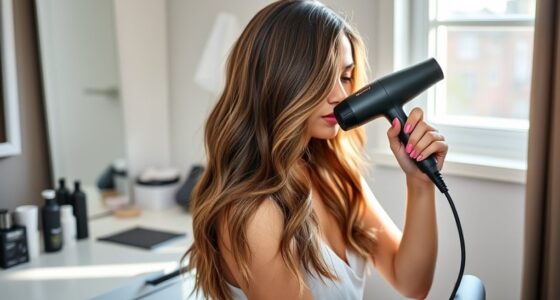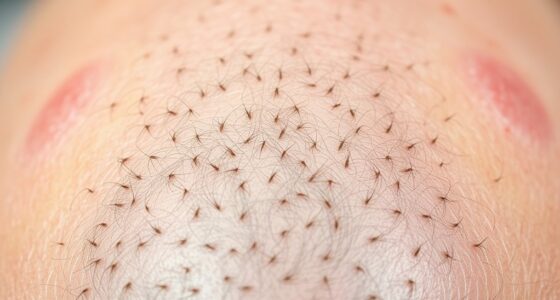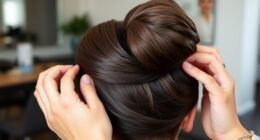You've likely experienced the damaging effects of alkaline shampoos, from dryness and brittleness to breakage and loss of shine. This is due to the high pH level, which disrupts your hair's natural balance, weakens the shaft, and strips away natural oils. To revive your hair, incorporate moisturizing mask treatments, deep conditioning methods, and hydrating leave-in products to combat dryness and damage. Look for pH-balanced products with nourishing ingredients like Argan Oil, and avoid silicones that can weigh your hair down. By making these changes, you can restore your hair's natural health and shine – and there's more to learn about tailored treatments for your specific hair concerns.
Key Takeaways
• Incorporate moisturizing mask treatments to hydrate and nourish damaged hair from alkaline shampoos.
• Use pH-balanced products to restore natural pH and mitigate damage caused by high-alkalinity shampoos.
• Counteract alkaline effects with nourishing treatments containing ingredients like Argan Oil to lock in moisture and improve texture.
• Switch to silicon-free, sulfate-free formulas that promote scalp health and natural hair bounce, preventing limpness and buildup.
• Neutralizing shampoos with a pH around 4.5 can counteract alkaline effects, restoring balance and preventing damage.
Understanding Alkaline Shampoo Damage
Damaging your hair with alkaline shampoos can lead to a vicious cycle of dryness, breakage, and frizz, making it essential to understand the harm they can cause.
When you use alkaline shampoos, you're stripping your hair of its natural oils, disrupting the pH balance, and paving the way for dry hair. The high pH level of these shampoos causes the hair cuticle to swell, making it more prone to tangling and breakage.
Continuous use of alkaline shampoos weakens the hair shaft, resulting in dullness, frizz, and lack of elasticity. Additionally, they can strip away hair color, especially in dyed or bleached hair, leading to fading and uneven tones.
It's important to recognize the damage alkaline shampoos can cause and take corrective action. By switching to pH-balanced products, like acidic shampoos, you can restore the natural pH of your hair and scalp, mitigating the damage.
Understanding the harm alkaline shampoos can cause is the first step towards repairing and reviving your hair.
Signs of Hair Damage Explained
Frequently, you'll notice that hair damage from alkaline shampoos manifests in a multitude of ways, making it important to recognize the signs to take corrective action. If you're using an alkaline shampoo, it's essential to be aware of the warning signs of damage to prevent further deterioration.
| Signs of Damage | Description |
|---|---|
| Dryness and Brittleness | Hair feels rough, lacks shine, and is prone to breakage |
| Split Ends | Hair splits, especially at the ends, leading to frizz and unmanageability |
| Difficulty Styling | Hair becomes uncooperative, resistant to styling products, and lacks hold |
| Rough Texture | Hair feels coarse, lacking the smooth, silky feel of healthy hair |
| Breakage and Tangling | Hair breaks easily, leading to excessive shedding and tangling |
How Ph Imbalance Affects Hair

As you explore the world of hair care, you'll likely come across the concept of pH imbalance, a common culprit behind damaged locks.
When your hair's natural pH balance is disrupted, often due to alkaline shampoos, it can lead to a host of problems, including dryness, brittleness, and breakage.
Alkalinity Disrupts Hair Ph
When you use alkaline shampoos, you're likely disrupting the natural pH balance of your hair, which can lead to a cascade of problems. Your hair's natural pH is slightly acidic, ranging from 4.5 to 5.5, and alkaline shampoos can push it out of balance.
As a result, your hair's structure weakens, making it more prone to dryness, breakage, and frizz. The cuticles on your hair shaft can become raised and rough, making your hair more susceptible to damage and moisture loss.
To make matters worse, alkaline pH can strip away your hair's natural oils, leaving it dull and rough. By using products with a pH closer to your hair's natural acidity, you can help restore balance and repair the damage caused by alkaline shampoos.
It's essential to be mindful of the products you use and choose ones that respect your hair's natural pH. By doing so, you can prevent further damage and promote healthy, vibrant hair.
Ph Level Imbalance Effects
Your hair pays the price when its pH balance is disrupted, leading to a host of problems that can leave your locks looking lackluster and feeling fragile. When your hair's pH balance is out of whack, it can lead to a multitude of issues that can leave you feeling frustrated and helpless.
Some of the devastating effects of pH imbalance on your hair include:
- Cuticle damage, making your hair more prone to breakage and dryness
- Stripping away of natural oils from the scalp, leading to a dry and itchy scalp
- Dull, rough-looking hair that lacks shine
- Faster fading of color-treated hair, causing it to lose its vibrancy
These problems can be overwhelming, but understanding the effects of pH imbalance is the first step in taking control of your hair's health.
Repair Remedies for Dry Hair
When it comes to repairing dry hair, you'll want to explore various treatment options that cater to your hair's specific needs.
You can start by considering moisturizing mask treatments that provide an intense dose of hydration, deep conditioning methods that help lock in moisture, and hydrating leave-in products that offer continuous nourishment.
Moisturizing Mask Treatments
Regularly incorporating moisturizing mask treatments into your hair care routine can be a game-changer for dry, damaged locks. These intensive treatments provide a much-needed dose of hydration, nourishment, and moisture to parched hair strands. By incorporating moisturizing masks into your routine, you'll start to notice a significant improvement in your hair's overall health and appearance.
Some of the benefits of regular moisturizing mask treatments include:
- Restoring your hair's natural shine and softness with ingredients like Argan Oil
- Strengthening your hair and reducing breakage
- Improving your hair's overall health and appearance
- Providing intense hydration and nourishment to dry, damaged hair
To get the most out of your moisturizing mask, apply it to damp hair, leave it on for the recommended time, and rinse thoroughly.
Deep Conditioning Methods
By incorporating deep conditioning methods into your hair care routine, you can effectively combat dryness and damage caused by alkaline shampoos and harsh chemical treatments. Regular deep conditioning can improve the appearance of dry, fine, and frizzy hair, especially after exposure to harsh chemicals. Using a deep conditioner after using alkaline shampoos can help manage frizz and improve overall hair health.
| Benefits of Deep Conditioning | How It Helps |
|---|---|
| Restores moisture and nourishment | Repairs dry, damaged hair |
| Provides essential nutrients | Strengthens and repairs hair fibers |
| Improves hair appearance | Reduces frizz and flyaways |
| Revives chemically treated hair | Maintains healthy, vibrant locks |
| Manages frizz and improves health | Enhances overall hair well-being |
Hydrating Leave-In Products
Hydrating leave-in products become your hair's best friend when dryness and damage take hold, providing a much-needed drink of moisture to parched strands. After exposure to alkaline shampoos, your hair cries out for nourishment, and that's exactly what these products deliver. They're packed with essential nutrients and hydration to revive and restore your hair's natural moisture balance.
By incorporating hydrating leave-in products into your hair care routine, you can:
- Say goodbye to dry, brittle hair and hello to soft, silky locks
- Reduce frizz and flyaways, leaving your hair looking healthy and vibrant
- Strengthen your hair strands, making them less prone to breakage
- Maintain the health and vitality of your hair, combating the effects of harsh chemical treatments
Regular use of these products can work wonders for your hair, leaving it looking and feeling its best.
Nourishing Treatments for Brittle Hair

To restore moisture and strength to your brittle hair, nourishing treatments can be a game-changer, especially if you've been using alkaline shampoos that strip your hair of its natural oils. These treatments are designed to counteract the effects of harsh chemical treatments on your hair, providing essential nutrients to repair and nourish damaged hair.
Ingredients like Argan Oil in these treatments help to lock in moisture, strengthen your hair, and improve its texture. By incorporating regular nourishing treatments into your hair care routine, you can greatly improve the appearance and manageability of your brittle hair.
Look for treatments specifically formulated for brittle hair to achieve the best results in repairing damage caused by alkaline shampoos. With consistent use, you can expect to see an improvement in the overall health and appearance of your hair.
Restoring Shine to Frizzy Hair
Strip away the dullness and frizz from your hair by switching to a pH-balancing shampoo, specifically formulated to restore shine and manageability to chemically treated locks. Alkaline shampoos can strip your hair of its natural oils, leaving it dull and frizzy. However, by using a pH-balancing shampoo, you can restore the natural shine and manageability of your hair.
To achieve this, look for ingredients like Argan Oil, which can nourish and moisturize frizzy hair. Regular use of a pH-balancing shampoo can improve the appearance and texture of frizzy hair over time.
Here are some benefits you can expect:
- Reduced frizz and flyaways, leaving your hair with a sleeker appearance
- Improved manageability, making your hair easier to style
- Restored shine and luster, giving your hair a healthy and vibrant look
- Nourished and moisturized hair, thanks to ingredients like Argan Oil
The Importance of Silicon-Free Formulas
As you work to restore shine and manageability to your hair, it's equally important to pay attention to the type of shampoo you're using, specifically avoiding formulas that contain silicones, which can weigh your hair down and negate the benefits you're trying to achieve.
Silicones in shampoos can leave a residue that builds up over time, making your hair look flat and greasy. By opting for silicon-free formulas, you'll prevent product buildup and keep your hair light and clean. This is especially vital for those with fine or thin hair, as silicones can weigh it down and make it appear limp.
Additionally, silicon-free shampoos are less likely to cause scalp irritation or clog pores, ensuring a healthier scalp environment. By avoiding silicones, you'll allow your hair to maintain its natural bounce, volume, and texture.
Neutralizing Alkalinity With Repair
When you've undergone chemical treatments like dyeing or bleaching, your hair's natural pH balance is disrupted, leaving it vulnerable to damage and breakage. This is where essential neutralizing shampoos come in – an important step in repairing your hair's health.
These specialized shampoos, with a pH level around 4.5, work to counteract the alkaline effects of chemical treatments, protecting your hair and scalp from damage.
Using a neutralizing shampoo can make a significant difference in the health and appearance of your hair. Here are just a few benefits:
- Neutralizing shampoos help restore your hair's natural pH balance, reducing damage and breakage.
- Ingredients like Argan Oil provide essential nutrition and moisture to revive damaged hair.
- Regular use can improve the appearance and overall health of your hair post-color service.
- Using a neutralizing shampoo immediately after dyeing can help prevent damage before it starts.
Revitalizing Damaged Hair Strands

As you work to revitalize your damaged hair strands, you'll need to focus on two critical areas: hair cuticle repair and moisture balance restoration.
By addressing these key aspects, you can effectively restore the health and appearance of your hair, making it stronger, softer, and more manageable.
Hair Cuticle Repair
You can start revitalizing damaged hair strands by focusing on hair cuticle repair, an essential step in restoring your hair's natural health and shine. After using alkaline shampoos, your hair cuticles may be stripped, leading to dryness and breakage. To repair this damage, it's important to use a pH-balanced shampoo with a formulation close to the natural pH of your hair, around 4.5.
Here are some key tips to keep in mind for hair cuticle repair:
- Opt for a shampoo with ingredients like Argan Oil to provide essential nutrients and moisture to revive damaged hair strands.
- Choose a sulfate-free shampoo to avoid further damaging already compromised hair cuticles.
- Regular use of a revitalizing shampoo can help strengthen and soften hair, reducing brittleness caused by alkaline treatments.
- Neutralizing shampoos can help counteract the damage caused by alkaline shampoos, so be sure to look for these when shopping for a new shampoo.
Moisture Balance Restoration
To revitalize damaged hair strands, restoring moisture balance is essential, as it replenishes lost moisture and nourishes hair with essential nutrients. Alkaline shampoos can strip your hair of its natural oils, leading to dryness and damage. Moisture balance restoration treatments help to replenish lost moisture and nourish damaged hair strands.
| Treatment Benefits | Ingredients | Results |
|---|---|---|
| Replenishes lost moisture | Argan Oil | Hydrated, soft hair |
| Nourishes damaged hair | Essential nutrients | Improved elasticity, strength |
| Reduces breakage, brittleness | Moisturizing agents | Healthy, shiny hair |
Maintaining Healthy Hair With Repair
By incorporating targeted repair treatments into your hair care routine, you can effectively counteract the damage inflicted by alkaline shampoos and restore your hair's natural health and vitality. To achieve this, opting for repair treatments that are specifically formulated to address the unique challenges posed by alkaline shampoos is crucial. These targeted repair treatments can help to replenish essential nutrients and moisture that may be stripped away by alkaline shampoos, leaving your hair feeling dry and brittle. In addition to repairing heat damage, these specialized treatments also work to strengthen and protect your hair from future damage, leaving it feeling smooth, soft, and revitalized. Look for products with ingredients such as keratin, argan oil, and silk proteins to effectively repair and restore your hair’s natural health and vitality.
Here are some key considerations to keep in mind when selecting a repair treatment:
- Opt for a product with a 4.5 pH formulation to protect against further damage
- Look for silicon-free formulas that incorporate nourishing ingredients like Argan Oil
- Be cautious when using repair treatments on damaged or black hair, as certain ingredients may not be suitable
- Follow proper usage instructions, such as using the repair shampoo immediately after dyeing hair and not for daily use, to maximize effectiveness
Frequently Asked Questions
How Do You Fix Alkaline Hair?
You're wondering how to fix alkaline hair?
Start by switching to a pH-balancing shampoo with a lower acidity level to neutralize the damage.
Then, incorporate a deep conditioning treatment to restore moisture and nourishment.
Limit your use of alkaline hair products and opt for sulfate-free options to prevent further damage.
Consider using a clarifying shampoo occasionally to remove buildup.
Is Alkaline Shampoo Good for Your Hair?
You may think alkaline shampoo is good for your hair, but it's actually causing more harm than good. The high pH level strips your hair of natural oils, disrupts the pH balance, and leads to dryness, damage, and frizz.
While it may be beneficial for removing product buildup, using it frequently weakens your hair shaft, resulting in dull, brittle, and rough texture. Limit its use and incorporate moisturizing products to maintain hair health.
How Do You Revive Chemically Damaged Hair?
To revive chemically damaged hair, you'll need to take a multi-step approach.
First, switch to a pH-balancing shampoo to neutralize alkaline effects.
Next, incorporate deep conditioning treatments to restore moisture and strength.
Consider trimming off split ends to prevent further breakage, and avoid heat styling tools to minimize additional damage.
Consult a professional stylist for personalized recommendations on how to best care for your damaged locks.
How to Repair Extremely Damaged Hair?
You're not alone in your struggle with extremely damaged hair – a staggering 60% of women experience hair damage due to chemical processing, heat styling, and environmental factors.
To repair your severely damaged locks, start by incorporating deep conditioning treatments with keratin and argan oil into your routine.
Limit heat styling, trim split ends regularly, and consider consulting a professional for specialized treatments like Olaplex or keratin treatments to restore your hair's health and vitality.
Conclusion
As you've learned, alkaline shampoos can wreak havoc on your locks. By understanding the signs of damage and the importance of pH balance, you can take control of your hair's health.
By incorporating nourishing treatments, silicon-free formulas, and neutralizing alkalinity, you can revive your damaged hair. Remember, maintaining healthy hair requires consistent repair and attention to pH levels.
By doing so, you'll be on your way to revitalizing your hair strands and enjoying a luscious, healthy mane.









